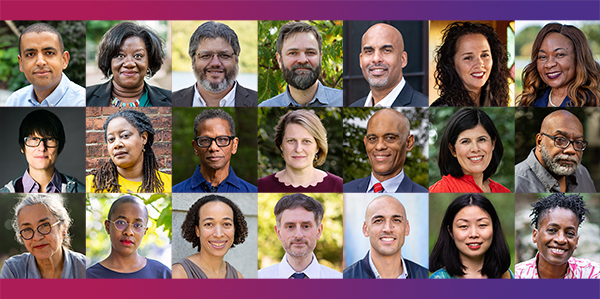Marlies Carruth, Director, MacArthur Fellows, reflects on the ways collaboration and communities inspire individual creativity and can help us all build a better future.
This year marks the 40th anniversary of the MacArthur Fellows Program. At its inception, the Fellowship was a philanthropic experiment, and since the earliest days, the Fellows Program has been committed to its original ambition of providing extraordinary doers and thinkers with multi-year, unrestricted financial support for their pursuit of an enormous range of human endeavors. Our awardees have been engaged in work in a variety of areas in social and historical scholarship, in public issues advocacy, in scientific research, in addition to many areas of artistic expression. It was then, and still is today, an award to individuals, to be used however the individual awardee sees fit—no strings attached, no reporting requirements. The goal has always been to enable awardees to be bolder, to take more risks, to dream bigger.
This Program comes into middle age at an unprecedented moment in America. Today, our headlines describe the ongoing fallout from a violent attempted insurrection at the U.S. Capitol, as Congress, one of the three pillars of our democracy, worked to certify the presidential election. Over the last year our headlines have captured communities across the U.S. confronting racialized terror, including the killings of unarmed Black and Brown men and women and the attempted peaceful protests that decry them. Against this violence and civil protest are the devastating effects of economic inequality, the global COVID-19 pandemic, and the breakdown of an over-burdened healthcare infrastructure that is the last line of defense against it. Other civic and protective institutions have been hollowed to their architectural beams and frames, intentionally or from neglect, now only vaguely recognizable, all to the detriment of our physical and emotional well-being.
In conversation with one another, we speak about individuals stepping up to confront these challenges, to fix what is broken, to build back from the ground up. But the enormity of the challenge, the breadth of the systems failure, is daunting and seems outsized to one individual’s ability to affect necessary change. What can we reasonably ask of the individual in this vast 21st-century societal reconstruction?
The state of our world today presents both an intimidating challenge and a once-in-a-generation opportunity—for our newly elected officials, for our local communities, for each and every one of us.
In 2021, as we mark 40 years of MacArthur Fellows, we are committed to continuing to identify, support, and amplify the energetic expansion of individual creativity and the myriad forms it takes. Through the Foundation’s expedited grant program, we are inviting Fellows to connect through public-facing programming to share ideas, find inspiration, and address real-world problems across different fields of endeavor, in groups small and large.
We are also finding new ways of increasing the visibility of collaborative practice. We will commemorate this important milestone through the Toward Common Cause exhibition, a multi-site 40th anniversary celebration scheduled to open this summer. It will feature the work of 28 MacArthur Fellows and call attention to the vital role that art can play in advancing social change. Presented in conjunction with the Smart Museum of Art at the University of Chicago and more than two dozen programmatic and research partner organizations across Chicago, this exhibition uses the idea of “the commons” to explore identity, environmental justice, the built environment and the natural world, and the various ways we communicate with one another.
The Toward Common Cause exhibition demonstrates that individuals and communities, working together across the domains of science, civic life, and art—in areas as salient as the abatement of lead in residential water lines or rebuilding the economic vitality of a neighborhood—can extend the reach and resonance of the problems we seek to solve. This exhibition also highlights our uniquely Chicago arts ecosystem, which is dynamic and diverse, creative and durable, and in constant dialogue with the issues of economic and civic life. Some artists are engaging with young people across the city, deepening the impact and meaning of the work they create together. These young partners are pragmatists and dreamers, talented collaborators, and responsible stewards of their neighborhoods who envision positive and sustainable futures for their communities.
We hope this exhibition will interest and delight familiar art audiences. But we also aim to attract new audiences—including civic-minded stakeholders and changemakers from non-arts backgrounds—and inspire them to reflect on their own work in generative ways.
Frontiers of practice and impact are evolving within the Fellows community, not only with artists. Our 2020 class of Fellows includes an econometrician, an evolutionary geneticist, a property law scholar, and an experimental physicist.
While some contours of the Fellows Program have changed since its inception, we remain true to our original design and focus. We see our Fellows push boundaries of craft and scholarship and, in the process, define new frontiers of collaboration and collective engagement. Rather than contradicting the idea of the exceptional individual and lone “genius,” we welcome this more expansive notion of creativity. We enthusiastically add networked forms of practice—which may begin with one exceptionally creative individual, but expand to include others—to the more literal description of our award. Collaborative engagement is catalytic, impactful, and essential in a range of endeavors. Both the individual who first conceives of a project, and the community partners who help realize the work by broadening its scale and scope, must be recognized and celebrated.
To quote from the essay “Genius as Circumstance,” by 2017 MacArthur Fellow, opera director and producer Yuval Sharon: “Moments, ideas, a single poem in a collection—a work of genius, no matter how individually wrought—is never the product of a single individual. We should stop thinking of genius as an attribute and instead start to think of it as a condition, a circumstance.”
It will take individuals and communities working in concert to recover, imagine, and build a better future.




